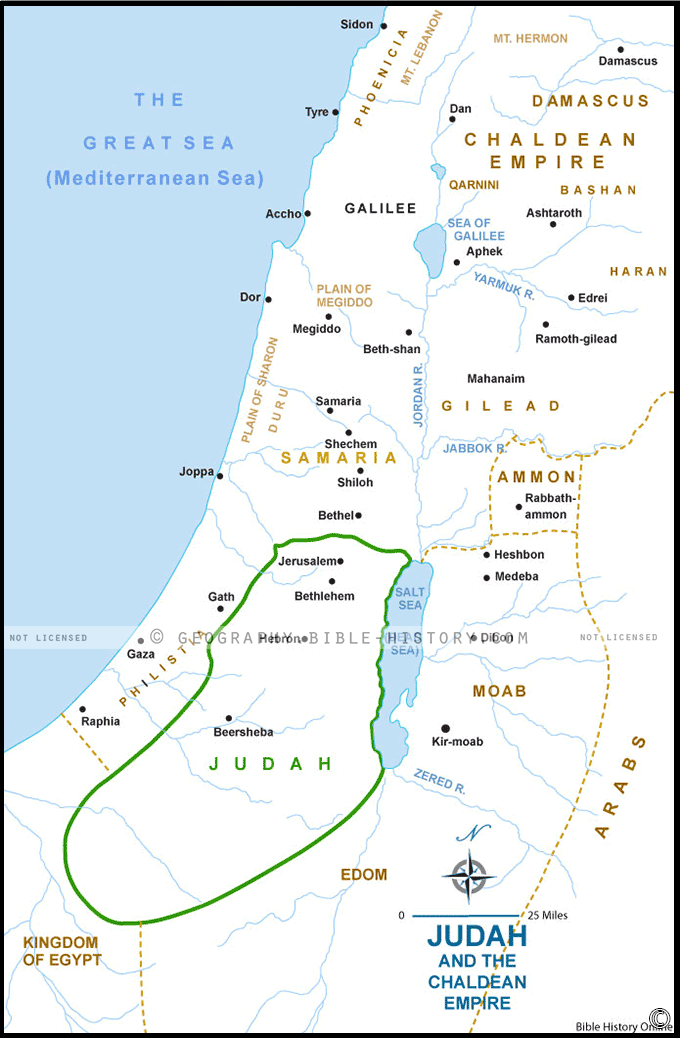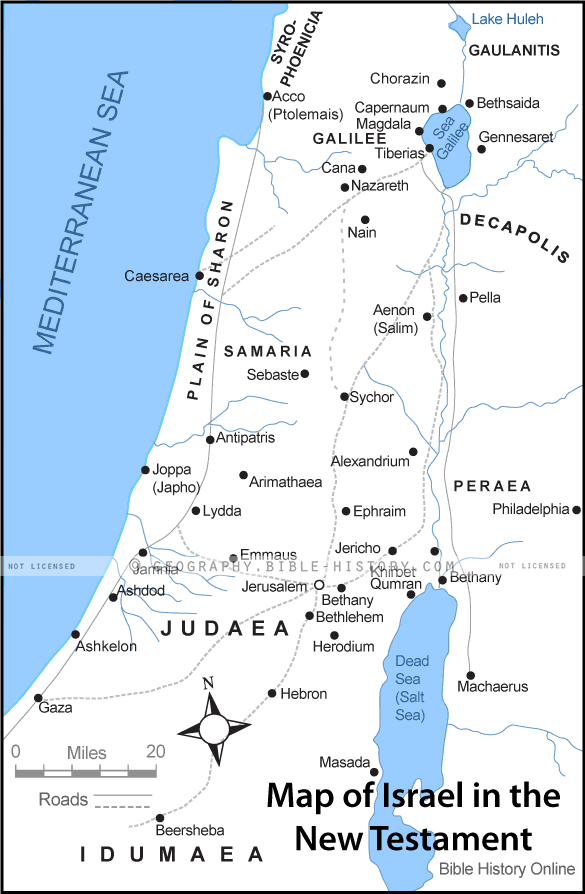Samaria was an area on the west side of the Jordan River where modern-day Israel and the West Bank now reside. It was once part of Canaan before Joshua led the Israelites to many victories in the region. The tribes of Manasseh and Ephraim probably held most of the territory that was known as Samaria before it later became the Northern kingdom of Israel.
The squabble between the supporters of kings Saul & David caused such a rift that it formed 2 separate kingdoms.
Saul's supporters formed the Northern kingdom of Israel while David's family line ruled the Southern kingdom of Judah.
The first mention of Samaria was in 1 Kings 13:32 with Jereboam, the Northern kingdom's first king.
1 Kings 16:23-24, 28-32 stated:
23. In the thirty-first year of Asa king of Judah, Omri became king of Israel, and he reigned twelve years, six of them in Tirzah.
24. He bought the hill of Samaria from Shemer for two talents of silver and built a city on the hill, calling it Samaria, after Shemer,
the name of the former owner of the hill.
...
28. Omri rested with his fathers and was buried in Samaria. And Ahab his son succeeded him as king.
29. In the thirty-eighth year of Asa king of Judah, Ahab son of Omri became king of Israel, and he reigned in Samaria over Israel twenty-two years.
30. Ahab son of Omri did more evil in the eyes of the LORD than any of those before him.
31. He not only considered it trivial to commit the sins of Jeroboam son of Nebat, but he also married Jezebel daughter of Ethbaal king of the Sidonians,
and began to serve Baal and worship him.
32. He set up an altar for Baal in the temple of Baal that he built in Samaria.
Most of the later Northern kingdom's kings reigned in Samaria.
1 Kings 17 and 18 told of the prophet Elijah speaking to Obadiah after he prayed for God to stop sending rain. As a result, there was a drought & famine in Samaria.
In 1 Kings 20, Ahab warred with Ben-Hadad king of Aram in Samaria and was victorious.
21:1 named Jezreel as the town where Ahab built his palace. In the same chapter, Ahab & his scheming wife killed Naboth to try to take his
land that was near Ahab's palace. Elijah scorned Ahab for this action and proclaimed a curse on Ahab that would affect his son.
Both kingdoms of Israel and Judah conspired against the Arameans and attacked them at Ramoth Gilead in 1 Kings 22 where
Ahab was killed in battle. Because of the curse, Ahab's son only ruled 2 years - 1 Kings 22:51:
51. Ahaziah son of Ahab became king of Israel in Samaria in the seventeenth year of Jehoshaphat king of Judah, and he reigned over Israel two years.
2 Kings 1:1-4:
1. After Ahab's death, Moab rebelled against Israel.
2. Now Ahaziah had fallen through the lattice of his upper room in Samaria and injured himself. So he sent messengers, saying to them, "Go and consult Baal-Zebub, the god of Ekron, to see if I will recover from this injury."
3. But the angel of the LORD said to Elijah the Tishbite, "Go up and meet the messengers of the king of Samaria and ask them, `Is it because there is no God in Israel that you are going off to consult Baal-Zebub, the god of Ekron?'
4. Therefore this is what the LORD says: `You will not leave the bed you are lying on. You will certainly die!'" So Elijah went.
2 Kings 2:25 told of Elisha, Elijah's replacement, traveling from Bethel to Samaria.
In 2 Kings 3, Ahab's son Joram partnered with Jehoshaphat to deafeat the Moabites.
Naaman, the Aramean army commander, sent for Elisha in Samaria to be healed of leprosy who told him to wash 7 times in the Jordan River - 2 Kings 5.


God safely allowed Elisha to return to Samaria after Arameans surrounded him and other prophets near the Jordan River. Elisha prayed that the Arameans be blinded so they could return safely in
2 Kings 6. Both verses 1 and 18 of 2 Kings 7 mention the gate of Samaria in a prophecy of Elisha during a famine where God routed
the Arameans who continued to threaten the kingdom of Israel.
Jehu kills off any potential succesors to the throne from Ahab's descendants to become king of Israel in 2 Kings 10:1-17.
2 Kings 10:35-36 mentioned his death:
35. Jehu rested with his fathers and was buried in Samaria. And Jehoahaz his son succeeded him as king.
36. The time that Jehu reigned over Israel in Samaria was twenty-eight years.
Several events in Samaria occurred in 2 Kings 13 such as the death of Jehu's successors to the throne (Jehoahaz and his son, Jehoash) as well as the death of Elisha.
2 Kings 14 recorded a spat between Judah & Israel after Judah defeated Edom. Israel's king, Jehoash, responded to a taunt by smashing part of the wall in Jerusalem and taking
hostages as well as taking treasures from the royal palace. 2 Kings 14:23:
23. In the fifteenth year of Amaziah son of Joash king of Judah, Jeroboam son of Jehoash king of Israel became king in Samaria, and he reigned forty-one years.
There was a line of kings in 2 Kings 15 with short reigns with the exception of Menahem who reigned 10 yrs. & Pekah who reigned 20 yrs. until the Assyrian king, Tiglath-Pileser,
attacked Israel and took prisoners back to Assyria.
2 Kings 17:1-6:
1. In the twelfth year of Ahaz king of Judah, Hoshea son of Elah became king of Israel in Samaria, and he reigned nine years.
2. He did evil in the eyes of the LORD, but not like the kings of Israel who preceded him.
3. Shalmaneser king of Assyria came up to attack Hoshea, who had been Shalmaneser's vassal and had paid him tribute.
4. But the king of Assyria discovered that Hoshea was a traitor, for he had sent envoys to So king of Egypt, and he no longer paid tribute to the king of Assyria, as he had done year by year. Therefore Shalmaneser seized him and put him in prison.
5. The king of Assyria invaded the entire land, marched against Samaria and laid siege to it for three years.
6. In the ninth year of Hoshea, the king of Assyria captured Samaria and deported the Israelites to Assyria. He settled them in Halah, in Gozan on the Habor River and in the towns of the Medes.
...
2 Kings 17:24-29:
24. The king of Assyria brought people from Babylon, Cuthah, Avva, Hamath and Sepharvaim and settled them in the towns of Samaria to replace the Israelites. They took over Samaria and lived in its towns.
25. When they first lived there, they did not worship the LORD; so he sent lions among them and they killed some of the people.
26. It was reported to the king of Assyria: "The people you deported and resettled in the towns of Samaria do not know what the god of that country requires. He has sent lions among them, which are killing them off, because the people do not know what he requires."
27. Then the king of Assyria gave this order: "Have one of the priests you took captive from Samaria go back to live there and teach the people what the god of the land requires."
28. So one of the priests who had been exiled from Samaria came to live in Bethel and taught them how to worship the LORD.
29. Nevertheless, each national group made its own gods in the several towns where they settled, and set them up in the shrines the people of Samaria had made at the high places.
2 Kings 18:9-10 reitereated that the Israelites were deported to Assyria, then in verse 34, the Assyrian field commander taunted the southern kingdom of Judah after most of Judah was also conquered.
2 Kings 21:13 warns Jerusalem that it will fall like the rest of Israel and Judah unless they repent. 2 Kings 23:18-19 has 2 references to Samaria during the reign of Josiah.
2 Chronicles 18:2-9 spoke of Jehoshaphat allied with Ahab;
2 Chronicles 22:9 - "Queen" Athaliah tries to secure the throne for herself;
2 Chronicles 25:13-24 - a spate between Jehoash, king of Israel, and Amaziah, king of Judah;
2 Chronicles 28:8-15 - Judah under Ahaz was plundered by the Arameans and Israel
Ezra 4:9-10,17:
9. Rehum the commanding officer and Shimshai the secretary, together with the rest of their associates--the judges and officials over the men from
Tripolis, Persia, Erech and Babylon, the Elamites of Susa,
10. and the other people whom the great and honorable Ashurbanipal deported and settled in the city of Samaria and elsewhere in Trans-Euphrates.
...
17. The king sent this reply: To Rehum the commanding officer, Shimshai the secretary and the rest of their associates living in Samaria and elsewhere
in Trans-Euphrates: Greetings.
Nehemiah 4:1-2:
1. When Sanballat heard that we were rebuilding the wall, he became angry and was greatly incensed. He ridiculed the Jews,
2. and in the presence of his associates and the army of Samaria, he said, "What are those feeble Jews doing? Will they restore their wall?
Will they offer sacrifices? Will they finish in a day? Can they bring the stones back to life from those heaps of rubble--burned as they are?"
"Samaria" occurrences also appeared in:
Isaiah 7:9; 8:4;
9:9; 10:9-11;
36:19;
Jeremiah 23:13; 31:5; 41:5;
Ezekiel 16:46-55; 23:4,33;
Hosea 7:1; 8:4-5;
10:5-7; 13:16;
Amos 3:9-12; 8:14
Obadiah 1:19:
19. People from the Negev will occupy the mountains of Esau, and people from the foothills will possess the land of the Philistines.
They will occupy the fields of Ephraim and Samaria, and Benjamin will possess Gilead.
Micah 1:1,5-6:
1. The word of the LORD that came to Micah of Moresheth during the reigns of Jotham, Ahaz and Hezekiah, kings of Judah--the vision he saw concerning Samaria and Jerusalem.
...
5. All this is because of Jacob's transgression, because of the sins of the house of Israel. What is Jacob's transgression? Is it not Samaria? What is Judah's high place? Is it not Jerusalem?
6. "Therefore I will make Samaria a heap of rubble, a place for planting vineyards. I will pour her stones into the valley and lay bare her foundations.
Luke 17:11: Now on his way to Jerusalem, Jesus traveled along the border between Samaria and Galilee.
Jesus speaks with the Samaritan woman at Jacob's well in John 4:4-9:
4. Now he had to go through Samaria.
5. So he came to a town in Samaria called Sychar, near the plot of ground Jacob had given to his son Joseph.
6. Jacob's well was there, and Jesus, tired as he was from the journey, sat down by the well. It was about the sixth hour.
7. When a Samaritan woman came to draw water, Jesus said to her, "Will you give me a drink?"
8. (His disciples had gone into the town to buy food.)
9. The Samaritan woman said to him, "You are a Jew and I am a Samaritan woman. How can you ask me for a drink?" (For Jews do not associate with Samaritans.)
The last Samaria occurrences showed up in Acts 1:8; 8; 9; 15:1-14
Because the Samaritans had taken the land of the Israelites (Northern kingdom), they were hated by Jacob's descendants (the Jews).
So, when he showed Samaritans that gave a better example of compassion than the Jews, he spurred the Jews to stop their nonsense and simply follow His teachings.
The only King James mention of "Samaritan" was found in 2 Kings 17:29.
Other mentions of "Samaritan" (in both versions) were in Matthew 10:5;
Luke 9:52; 10:33; 17:16;
and John 4:22, 39-40; 8:48.